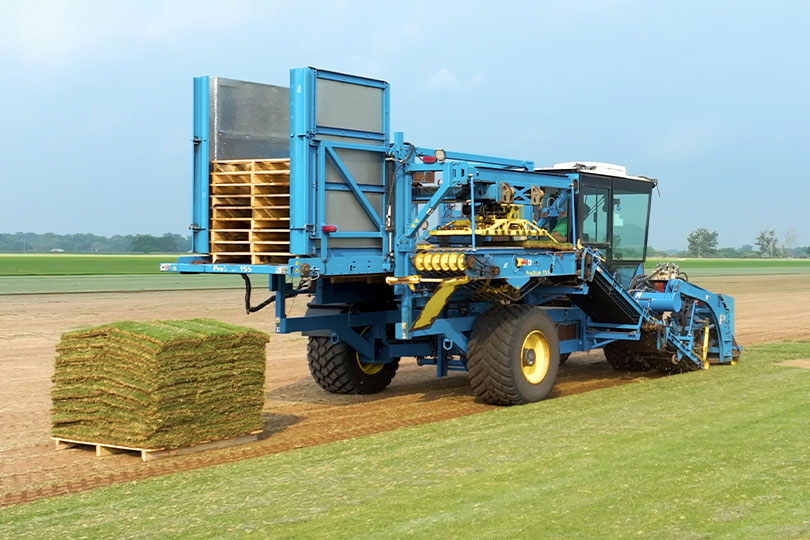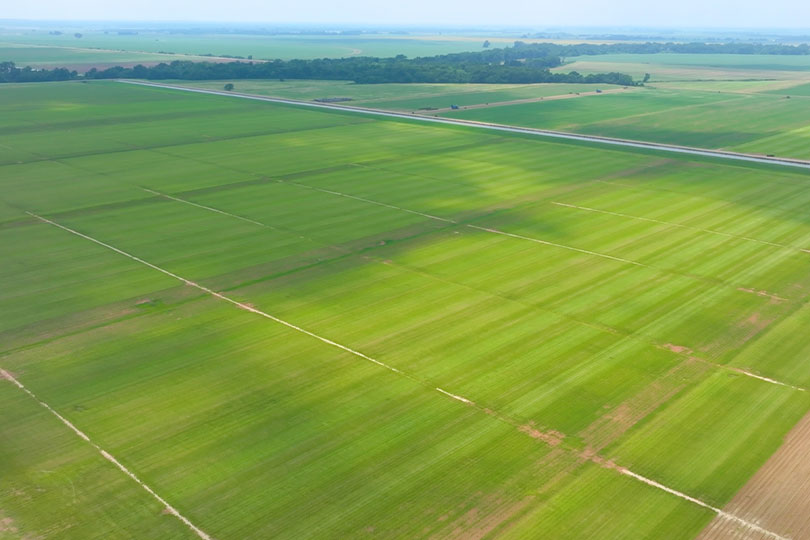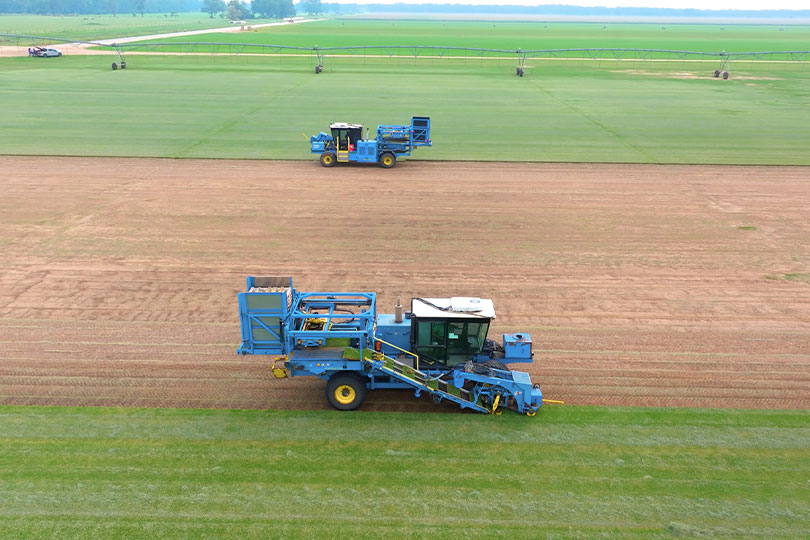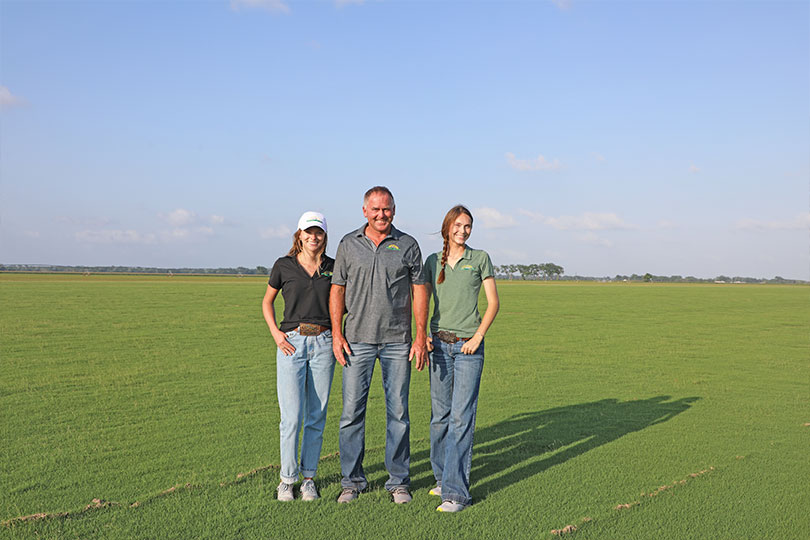By Shelby Shank
Field Editor
Growing up, Caroline Krenek and Haley Alford were deeply rooted in their family’s sod farm.
“We’d help our dad stack grass, move equipment, and that grew into us doing things independently and helping out on the farm,” Krenek said.
When Krenek went off to college, she found herself coming home every weekend to work on the farm and knew that was where she wanted to stay.
And Alford was inspired to stay on the farm by her late grandmother’s servant heart.
“She taught a strong foundation in our family of helping others. She always had a green thumb and was good at talking with others and helping them solve their problems,” Alford said. “She instilled in me that if you really have a connection with someone, you can help them find out what they need for their yard. It makes me feel good knowing I’m continuing in her footsteps.”
Together, the sisters take immense pride in their work at Horizon Grass Farms, ensuring its growth for future generations.
“Growing up on a sod farm, I guess I didn’t realize how lucky we were until I was older,” Alford said. “Once you get older, you really gain an appreciation for what our family has built, and it’s a really deep appreciation for what we do and take deep pride in helping others in the community by selling a good product.”
Deep-rooted legacy
Their grandfather, Willie Gavranovic, started row cropping before he decided to diversify his farm with turfgrass in 1978.
“It was an interesting start, but a good start,” said Will Gavranovic, the second generation on the farm. “When you start something from the very beginning, from scratch, you have the most appreciation to where it has grown and the opportunities that are now in the business.”
One blade at a time, Horizon Grass Farms has expanded significantly, covering nearly 5,000 acres of turfgrass.
The family farm has become one of the largest privately-owned sod farms in Texas, operating in both Milam and Wharton Counties, enabling them to meet consumer demands efficiently across the state.
Most of the turfgrass they grow services top major cities in Texas, including Houston, Dallas, Fort Worth, Austin and San Antonio.
The green grass can be found on lawns, golf courses, commercial areas or sports fields.

From field to yard
Horizon Grass Farms grows Bermudagrass, St. Augustine and Zoysia, among several other varieties.
Bermudagrass is the most drought-tolerant variety and popular among consumers.
“It’s a really hot grass on the market right now because a lot of cities in Texas are putting limitations on their water,” Krenek said. “Bermudagrass requires a lot less water to grow than some of the other varieties.”
Turfgrass is grown in “turtlebacks” or fields that are designed with a perfect slope in the middle to create a hump-back and has two drain ditches on the end.
“Every time it rains, all the water drains to the ditches, and it drains really fast so we can get in there and harvest faster,” Krenek said.
Once done by hand, the grass is now harvested using a machine called a Firefly.
“The machine will enter the turtleback, and they’ll cut a strip down. The blade cuts underneath the layer, and then it’ll go on a conveyor and go onto a pallet,” Krenek said.
The blade scrapes an inch of the soil to hold the root system along with the grass on top.
“It’s not taking too much of the soil with it, but just enough to hold it until it arrives to its next home,” Alford said. “We’re really big on farm fresh. As soon as the grass is cut, we have trucks lined up in our fields, ready to go. We dispatch them on a daily basis. Once the grass is loaded on the trucks, they are headed to their locations.”
The product has to be delivered fast.
“It has a shelf life of one to two days in the summer because it gets really hot,” Krenek said. “Once the sod is harvested, it immediately has to get to the truck as fast as possible and get to the customer.”

Challenges
Turfgrass is a year-round crop that doesn’t need to be replanted and is harvested daily.
“You have to be good with your logistics, how much you harvest each season, your maintenance and everything,” Krenek said. “You just have to make sure everything’s ready at the right time.”
But sometimes the grass isn’t always greener on the other side and meeting demand can be tricky.
It can take anywhere between six months to a year for the sod to grow back and be harvested again.
Environmental factors play a significant role in the success of turfgrass.
Extreme weather conditions, such as the freeze of 2021, devastated some growers.
“The freeze in 2021 was really bad on a lot of sod farmers,” Krenek said. “We had to replant after that, and we’re still trying to catch up.”
Inconsistent rainfall also presents challenges.
While rain is essential for growth, excessive rainfall can halt harvesting. Turfgrass fields need to be dry enough for effective cutting, and prolonged wet periods can cause delays.
Family tradition
“Growing turf is a long-term business,” Gavranovic said. “You don’t put turf in and then two or three years later you plow it up or move along. It’s at least a 10-to-15-year business.”
Horizon Grass Farms was established with a deep-rooted commitment to quality and community.
“To see the years of work and effort and wondering where you’re going, how you’re going to get there, and being able to accomplish this and pass it on—that’s what we’re doing,” Gavranovic said.



Leave A Comment